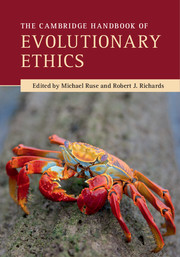Book contents
- The Cambridge Handbook of Evolutionary Ethics
- Cambridge Handbooks in Philosophy
- The Cambridge Handbook of Evolutionary Ethics
- Copyright page
- Contents
- Contributors
- Acknowledgments
- Introduction
- Part I Historical
- Part II For Evolutionary Ethics
- Part III Against Debunking Arguments
- Part IV Elaborations
- Bibliography
- Index
- References
Bibliography
Published online by Cambridge University Press: 31 August 2017
- The Cambridge Handbook of Evolutionary Ethics
- Cambridge Handbooks in Philosophy
- The Cambridge Handbook of Evolutionary Ethics
- Copyright page
- Contents
- Contributors
- Acknowledgments
- Introduction
- Part I Historical
- Part II For Evolutionary Ethics
- Part III Against Debunking Arguments
- Part IV Elaborations
- Bibliography
- Index
- References
- Type
- Chapter
- Information
- The Cambridge Handbook of Evolutionary Ethics , pp. 289 - 316Publisher: Cambridge University PressPrint publication year: 2017



